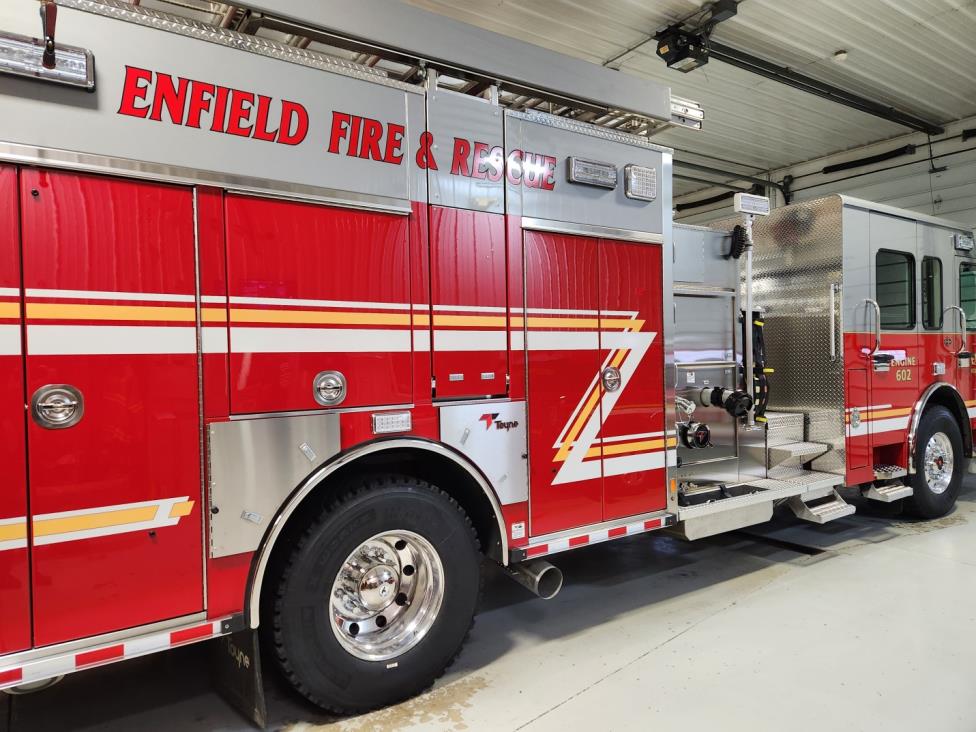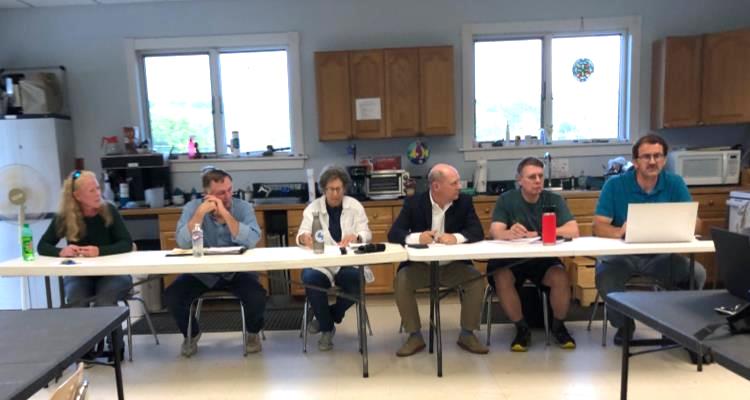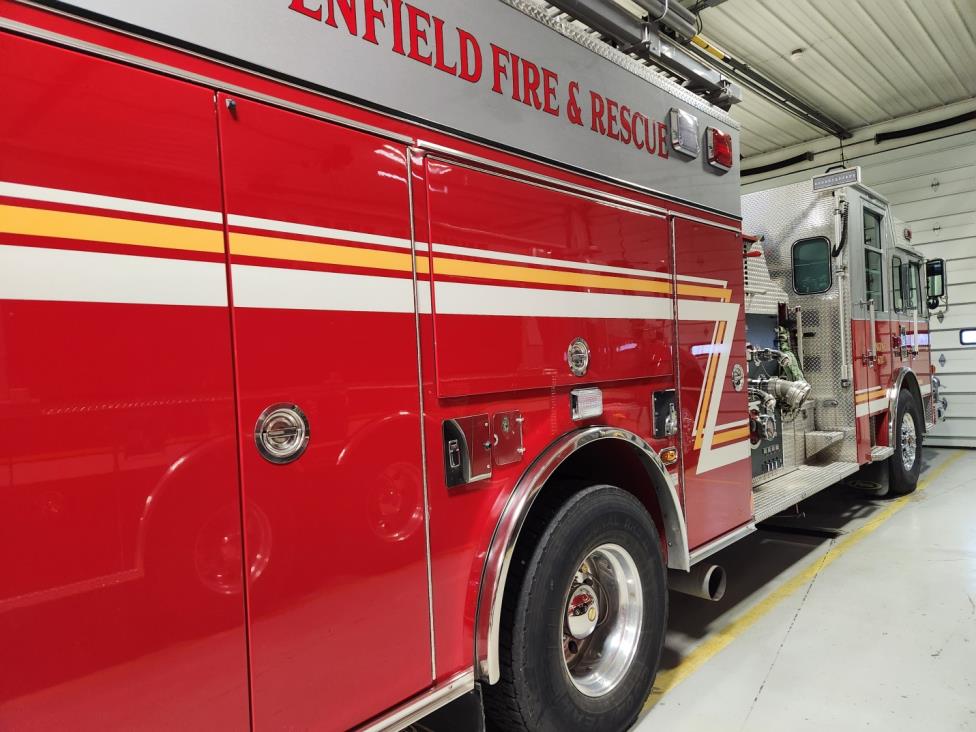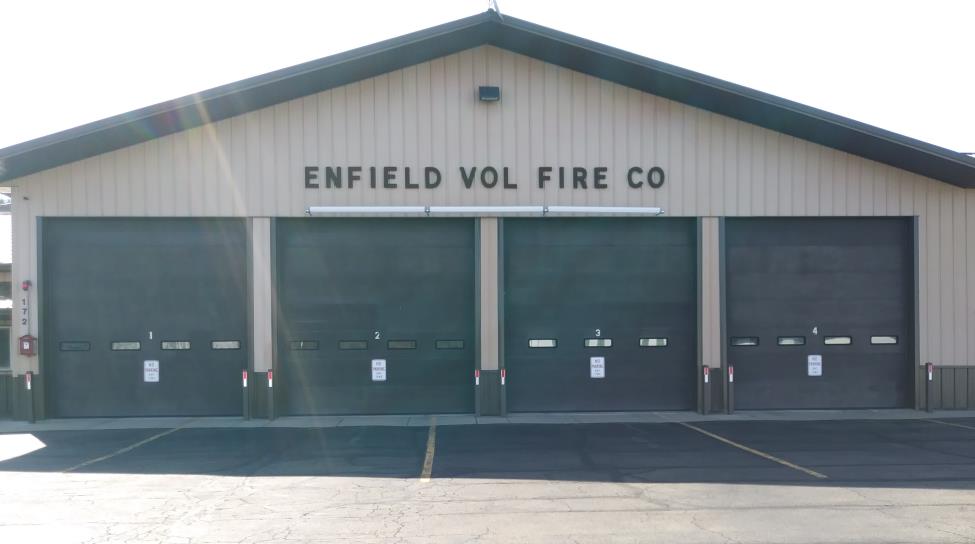Commissioners’ Chair warns of fire truck give-back should bonding vote fail
Reporting and Analysis by Robert Lynch; October 22, 2023
“Pay me now or pay me later.”
Enfield Volunteer Fire Company Pres. Dennis Hubbell, regarding funding for the EVFC’s new pumper.
Last Thursday’s was billed as a Public Hearing on the fledgling Enfield Fire District’s first-ever budget. But the night’s attention focused almost entirely on what this Town Councilperson aptly described as the “Elephant in the Room,” an expensive new pumper truck that the Enfield Volunteer Fire Company (EVFC) bought and which now the District and its taxpayers are agonizing over how to pay for .

“If we did not bond,” Board of Fire Commissioners Chair Jim Mathews warned attendees at the hearing’s start, the alternative would be “pretty crushing for our budget.”
And if the scheduled Halloween referendum on whether to buy from the EVFC that $830,000 new pumper engine plus another unpaid truck goes down to defeat, Mathews laid out only two remaining choices: “We raise taxes or we give back the truck.”
Surrender of the newly-bought engine had never before been stated publicly by Fire Commissioners as a serious option. But Mathews’ statement made it one. The Chairman also made clear it’s an option he’d hate to pursue.
“I am not suggesting we give the pumper back,” Mathews qualified later in the hearing. But, he admitted, “That option does exist. It’s a profoundly stupid option…. I’d be profoundly aghast if we gave the pumper back”
And it also may be an option that won’t work. That’s because when the EVFC bought the engine, executing paperwork that closed earlier this year, it obtained Town Board endorsement to secure tax-exempt financing from a private commercial bank.
In my own three-minutes of speaking time at the Public Hearing, this Councilperson suggested that by sanctioning the Fire Company’s expensive purchase in February, the Town Board may have obligated Enfield Town Government—and also Enfield taxpayers—to compensate for any loss the bank incurs should the EVFC default. When I raised that costly, risky hypothetical, EVFC President Dennis Hubbell, across the room, nodded his head.
“That truck ain’t going back,’ Hubbell said later in the hearing. The company president predicted that were the lending bank to repossess the pumper, it would offload the truck to whoever would buy it, likely at a substantial loss. Used fire apparatus tends to lose resale value quickly as soon as it’s driven off the manufacturer’s lot, even more so than cars.
“Pay me now, or pay me later,” Hubbell remarked concerning the choices he saw as viable: either continuing to pay off the truck under terms of the nine-year loan the EVFC secured, or else taking the bonding route that Commissioners’ Chair Mathews supports. Hubbell, himself, stated no public preference.
How things got where they are now deserves some explanation. When the Enfield Volunteer Fire Company executed the pumper truck’s purchase, the Enfield Fire District, itself, did not exist. The Town Board created the District in June and transferred the Town Board’s own fire service oversight to it beginning on August first. Now, it’s the Fire District, with its currently-appointed Board of Fire Commissioners, that must contract with the EVFC for fire trucks, as well as for its fire house, hose, and everything else.

Despite an attorney’s initial reluctance, the Fire Commissioners voted unanimously September 25th to put to a referendum the District’s purchase and its subsequent bonding of the two unpaid trucks for a total bond obligation of $1.05 Million. In addition to the new pumper, the District would seek to bond $220,000 for a new tanker truck placed into service three years ago and still not paid off.
Because of the attorney, Brad Pinsky’s desire to have the bonding question resolved before the Commissioners must finalize their next year’s budget during the first few days of November, Pinsky took it upon himself only after the Commissioners’ late-September meeting, to schedule the bonding referendum for Halloween.
The Fire Commissioners’ draft budget, which was supposed to have been the subject of Thursday night’s hearing, tentatively assigns $65,000 toward the trucks’ debt service, assuming voters approve bonding the two vehicles. That $65,000 is, itself, an educated guess, since no one knows for sure what the bonds’ interest rates may be. At its prior meeting, Pinsky conceded that current bonding rates “suck.”
But should voters reject bonding on Halloween, the added debt burden could force budget planners to start from scratch. Instead of a $65,000 bond payment, Mathews warned that paying on the existing loans could cost the District $185,000 next year ($120,000 for the new pumper alone.) The Chairman’s estimate, of course, assumes that the Commissioners will not give either or both trucks back.
Paying on those current loans, Mathews cautioned, would mean a “significant increase” in the fire tax, an increase that he, personally, stands unwilling to accept. The Chairman calculated that swallowing those loan payments would inflate the fire tax by 37 per cent over that of the current year.
Enfield needs “a capable front-line pumper to protect public safety,” Mathews told the hearing. “The apparatus does not last forever,” he cautioned.
Seldom mentioned in the context of Enfield’s fire-readiness, however, is that a second pumper engine remains in the fire house on stand-by. It’s a truck about 13 years old. Asked after the hearing about whether the EVFC could move the older vehicle into primary status were the newer pumper surrendered, Hubbell hedged. He conceded the possibility, but said there’d be operational problems involved when equipping just one such truck for fighting a fire.

“Our current contract (with the Town) has a clause to have ‘modern fire equipment.’ We’re continually obligated to keep apparatus modern,” Enfield Fire Chief Greg Stevenson told the hearing. Stevenson said New York State rules generally regard 20-year old fire apparatus—including the 2002 pumper the EVFC sold just recently to make room for the new one—to stand at the end of its useful life.
About 20 people, many of then known EVFC volunteers, attended the October 19 budget hearing in-person. A few more attended by Zoom, through the Town’s online connection that night proved tenuous at best. (The hearing began a half-hour late because of those problems.) Of those attending, only about seven spoke, including this Councilperson, spoke.
“Let’s not mortgage the future to salvage the moment,” this Councilperson, Robert Lynch, told the hearing. This writer was the only Town Board member to attend that night. Fearing how 20-year bonding would add to the vehicle’s total cost and continue payments on the newly-bought pumper until it was “junk,” this Councilperson urged everyone to “eat their peas” and, if necessary, absorb the added cost of the new apparatus under existing loans, despite the short-term financial pain.
This Councilperson also warned that the Town Board’s February vote to affirm the EVFC’s loan application could effectively preclude surrendering the new engine, lest such a surrender obligate Enfield taxpayers. And before voters ballot on Halloween, I said, Fire Commissioners should prepare side-by-side spreadsheets documenting the apparatus’ comparative total cost under either the proposed bonding or current bank financing.
After Thursday’s hearing, Fire District Secretary Alexis Comparetta said she’d attempt to compile the requested spreadsheet and present it perhaps as soon as the Commissioners’ next meeting, October 23.
“Bob is correct,” Jim Mathews acknowledged. “There are a lot of legal pitfalls to giving the pumper back.” Mathews did not elaborate, but only added that such a giveback “would expose us to a lot of risk.”
Not all appreciated my reporter’s focus on Mathews’ first disclosure that night of the serious consideration he gave a fire truck’s potential surrender. Fire Commissioner Robyn Wishna stands among my critics.
“There is no need for inflammatory headlines or statements to make this into something that it is not,” Wishna wrote on Facebook in reply to this Councilperson’s initial report October 19 of the Public Hearing. “You failed to include the fact that many/most fire districts (not in affluent towns) do bond their trucks—it’s a common practice.”
Criticism aside, I stand by how I reported this story. I always approach what I write from the objective standpoint of a journalist, not a meeting participant or an advocate. In my judgment, Chairman Mathews’ acknowledgement of the truck’s potential giveback stood as the most newsworthy statement of the night. Others may disagree. They can write their own accounts.
And yes, directed to Commissioner Wishna’s latter point, stand-in legal counsel Zach Longstreth—Brad Pinsky was physically absent for this, his fifth consecutive meeting—said that many, if not most, other fire districts do bond apparatus. But as Wishna also took note, Longstreth said that those districts that don’t bond have the resources to pay for their fire trucks with cash.
Whichever route Enfield takes in figuring the finances on its fire trucks, the bank loan that Dennis Hubbell touted ten days earlier as such a bargain is not as cheap as was first thought. Hubbell had on that earlier night told Commissioners that the pumper’s nine-year loan carried an interest rate of about four per cent. Not so. The Fire Company’s President checked his paperwork. It seems that the bank hiked its rate to 5.99 per cent by the time the documents got signed. The rate’s knocked down to 5.74 per cent if paid the way the bank prefers. Hubbell says the EVFC does it the bank’s way.

Halloween is a weird day for a bonding referendum. But that’s when it’ll take place. Enfield voters will cast ballots at the fire house this time, either from 9 AM until Noon; or again, from 6PM until Nine. It’s a big deal. $1.05 Million in fire truck bonding lies on the line; your money, your debt.
“There’s a lesson well-learned for everyone here,” Fire Commissioner Geoff Hollister told Thursday’s hearing. “We need a reserve fund. This is a band-aid.”
****
Perhaps, but nowhere does money grow on trees, particularly in property-poor towns like Enfield. I have a problem with mortgaging the future when it will likely cost us more in the long run. I have a problem with banking my hopes on elusive “grant money” that may never arrive. I have a problem with bonding things that roll, rather than buildings that remain in place, anchored to the earth. But my vote is my own, and your vote is yours. Please vote on Halloween. Even if you arrive in costume.
###

